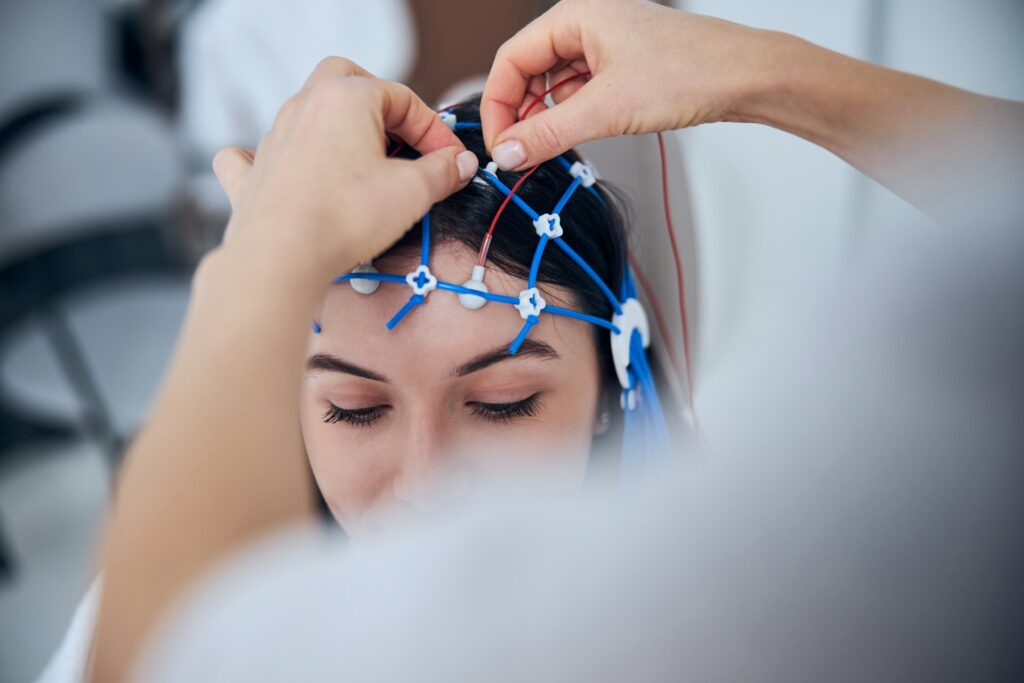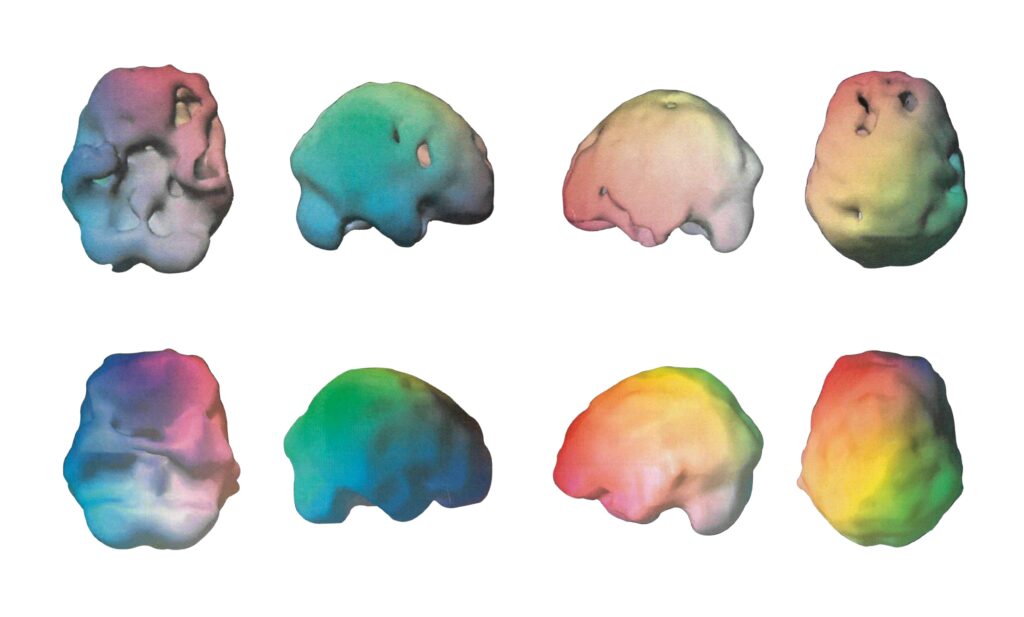qEEG Brain Mapping & Neurofeedback

Supplement your journey towards long-term healing with quantitative electroencephalogram (qEEG) brain mapping and neurofeedback in Malibu. Add neurofeedback to your already robust treatment plan at Amend, working to alleviate chronic stress, enhance mental well-being, and foster brain plasticity.
- 86 Billion Nerve Cells: Explore the intricate network of your brain, comprised of 86 billion nerve cells that transmit information through electrical impulses and chemical signals.
- 19 Wavelengths: Our meticulous measurement of 19 diverse wavelengths provides a comprehensive understanding of your brain’s functioning and cognitive health.
- 11+ Conditions: Benefit from our integrated approach to address various neurological and psychiatric conditions, including stress, anxiety, depression, and ADHD.
Unlock Your Cognitive Potential with QEEG & Neurofeedback at Amend
With qEEG brain mapping, you can visually track your brain’s changes throughout your stay at Amend – from admission to discharge.
In less than 45 minutes and with little to no discomfort, our neurofeedback providers can map your brain’s unique patterns and function with a qEEG assessment, often called “brain mapping.” This non-invasive procedure involves placing a cap-type device on the scalp to measure electrical activity and capture the dynamic patterns of neuronal activity, offering insights into the brain’s functional state.
Embedded with electrodes to measure your brain activity, the qEEG cap produces a detailed 3D rendering of your brain, which is then compared against standard brain activity measurements. This technology captures the dynamic patterns of neuronal activity, offering insights into the brain’s functional state. The resulting 3D maps allow clinicians to identify areas of the brain that may be underactive or overactive, contributing to psychiatric or neurological conditions.
A full qEEG report doesn’t diagnose anything, but it does provide immense amounts of insight into overactive and underactive portions of your brain, along with a thorough interpretation of each measurement. Your analysis may include hyperactivity or hypoactivity in portions of the brain that typically signify anxiety, depression, hypervigilance, etc.
“Change Your Mind”: Neurofeedback for Neuroplasticity
Neurofeedback, a direct application of the insights gained from qEEG, is a biofeedback modality that focuses on training individuals to alter their brainwaves. This training involves interactive exercises that adjust in response to the user’s brainwave patterns, promoting adaptive neurological changes. Through real-time feedback based on ongoing measurement of your brain waves, you’ll learn to regulate your brain activity, alleviate symptoms, and foster enduring cognitive improvements.
This tailored treatment can significantly relieve symptoms of various conditions, including ADHD, anxiety, depression, and stress, by directly targeting the underlying neurological patterns associated with these issues. Our comprehensive services provide a deeper understanding of your cognitive functions, allowing you to engage in real-time brain training and monitor your progress effectively.
Experience the Power of Neurofeedback
- Safe and FDA-Approved: Our neurofeedback treatment is safe, FDA-approved, and tailored to promote stress reduction and cognitive enhancement.
- Long-Term Benefits: Enjoy enduring effects beyond the treatment period, fostering sustained cognitive enhancement and well-being (Arns et al., 2014; Vernon et al., 2004).
- Customized Solutions: Our tailored neurofeedback sessions in your personalized plan adapt to your unique brainwave patterns in real time, maximizing effectiveness and optimizing outcomes.

The Research on Integrated qEEG and Neurofeedback Services
- Alleviate Mental Health Symptoms: Meta-analyses have demonstrated significant reductions in symptoms associated with anxiety, depression, and ADHD through neurofeedback interventions (Kerson et al., 2013; Micoulaud-Franchi et al., 2015).
- Enhance Cognitive Function: Published research highlights neurofeedback’s efficacy in improving attention, focus, and impulse control – offering promising outcomes for individuals seeking cognitive enhancement (Zuberer et al., 2015; Enriquez-Geppert et al., 2017).
- ADHD Support: Research indicates significant improvements in ADHD symptoms and sustained relief from neurofeedback interventions (Arns et al., 2009; Thibault et al., 2018).
- Emotional Stability: Longitudinal studies reveal neurofeedback’s ability to stabilize and regulate emotions – fostering emotional resilience and improved mood (Gruzelier, 2014; Ros et al., 2019).
- Optimize Sleep and Cognitive Performance: Neurofeedback may enhance sleep quality, improve mood, and increase mental clarity – increasing overall cognitive performance and well-being (Sterman, 2000; Arns et al., 2014).
Potential Side Effects of Neurofeedback
While neurofeedback is non-invasive and generally well-tolerated, some clients may experience mild adverse effects, including headaches, dizziness, and temporary cognitive impairment. Our experienced team ensures personalized care and support to mitigate any discomfort during your neurofeedback sessions.
Neurofeedback at Amend Treatment in Malibu: A Complementary Healing Modality
Our comprehensive residential treatment center offers neurofeedback in Malibu as an add-on to core care programming at Amend. Insurance may cover your neurofeedback sessions, or they are available as an additional treatment cost. Tailored neurofeedback sessions (and a 30-day neurofeedback plan) complement traditional therapeutic modalities, offering an additional tool in your tool belt for healing and growth during your recovery journey at Amend Treatment.
Amend Treatment’s evidence-based and holistic approach to mental health integrates qEEG and neurofeedback within a broader therapeutic context. This multimodal strategy enhances the efficacy of treatment by addressing the complex needs of each individual, combining these advanced technologies with traditional therapy modalities to promote healing and growth.
Ready to Begin Your Journey at Amend?
Take your next step with a free, confidential consultation over the phone at (866) 875-3411, or submit your insurance information for a free benefits verification. Our experienced team looks forward to hearing your story and working with you to decide if we are the right fit.
Have Questions or Need More Information?
We completely understand. The decision about where to receive residential treatment can be overwhelming. We’re here to help. Contact our dedicated intake team via phone or our brief contact form for personalized assistance and guidance. Whether you’re seeking clarity on treatments, processes, or payment options, we’re here to support you throughout your journey toward healing.
Content References:
- Arns, M., et al. (2009). Efficacy of neurofeedback treatment in ADHD: The effects on inattention, impulsivity, and hyperactivity: A meta-analysis. Clinical EEG and Neuroscience, 40(3), 180-189.
- Arns, M., et al. (2014). Evaluation of neurofeedback in ADHD: The long and winding road. Biological Psychology, 95, 108-115.
- Enriquez-Geppert, S., et al. (2017). EEG-neurofeedback as a tool to modulate cognition and behavior: A review tutorial. Frontiers in Human Neuroscience, 11, 51.
- Gruzelier, J. H. (2014). EEG-neurofeedback for optimizing performance. I: A review of cognitive and affective outcome in healthy participants. Neuroscience & Biobehavioral Reviews, 44, 124-141.
- Kerson, C., et al. (2013). Use of neurofeedback in clinical practice for attention deficit/hyperactivity disorder: A meta-analysis. Journal of Clinical Psychiatry, 74(9), 1-9.
- Micoulaud-Franchi, J. A., et al. (2015). EEG neurofeedback treatments in children with ADHD: An updated meta-analysis of randomized controlled trials. Frontiers in Human Neuroscience, 9, 1-11.
- Ros, T., et al. (2019). Consensus on the reporting and experimental design of clinical and cognitive-behavioural neurofeedback studies (CRED-nf checklist). Brain, 142(6), 1674-1685.
- Sterman, M. B. (2000). Basic concepts and clinical findings in the treatment of seizure disorders with EEG operant conditioning

